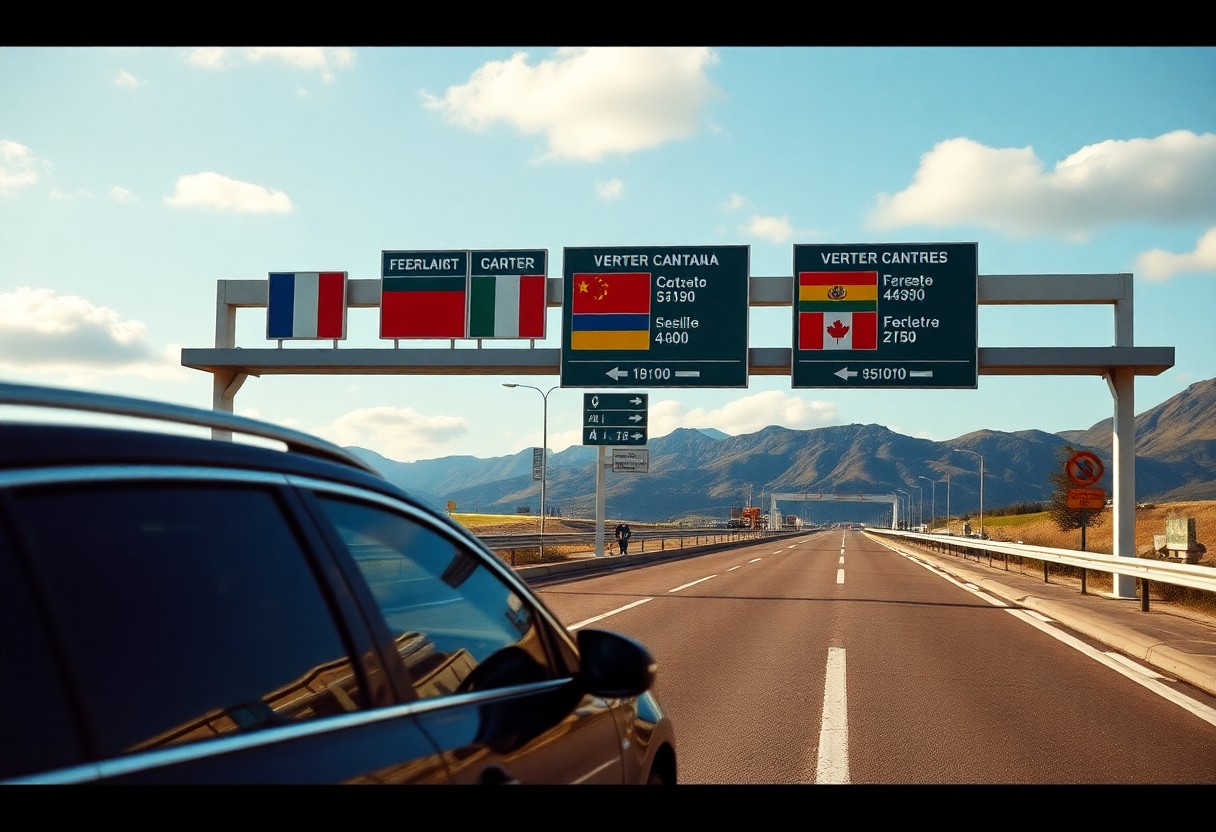Planning your European road trip with a rental car is crucial for ensuring a seamless and enjoyable travel experience. This involves not only strategic route planning but also a comprehensive understanding of cross-border regulations unique to different countries. While most rental companies permit travel throughout Western Europe, they often impose specific restrictions on driving into Eastern Europe. To avoid any unexpected surprises, it is vital to read your rental agreement thoroughly, as it will outline permissible borders and any potential fees. Before finalizing your booking, confirm that your selected rental company allows travel to all your desired destinations, as disregarding cross-border rules may void your insurance and lead to hefty fines. Therefore, gathering accurate information on these regulations is essential for your road adventure across Europe.
Understand the Legal Requirements for Cross-Border Driving in Europe
Before embarking on your exciting journey across Europe in a rental car, it’s imperative to meet specific legal and rental company conditions. Ensure your rental agreement explicitly indicates that cross-border travel is permitted and that you have valid insurance coverage for every country on your itinerary. Many rental companies enforce restrictions based on European zones, and these rules can be even more stringent for luxury vehicles. Therefore, taking the time to familiarize yourself with these requirements will help you avoid any complications that may arise during your travels, allowing you to focus on enjoying the scenic routes and cultural experiences that Europe has to offer.
Secure Your International Driving Permit (IDP) for European Travel
Acquiring an International Driving Permit (IDP) is one of the most crucial steps you need to take for driving in Europe. This permit acts as a valid translation of your home country driver’s license and is legally required in many European countries. It’s important to obtain your IDP in your home country before your travel plans kick off. By securing your IDP ahead of time, you ensure compliance with local laws, which facilitates a smoother driving experience across various nations, allowing you to fully immerse yourself in the beauty and culture of Europe without the stress of legal complications.
Explore Mileage Policies and General Restrictions on Rental Cars
When renting a car in Europe, many rental agencies provide vehicles with unlimited mileage options, which can significantly enhance your travel flexibility. However, it’s essential to be aware that border crossing fees do apply, and these fees can vary significantly, typically ranging from €5 to €47.60 per crossing, depending on the rental company and the specific countries involved. Furthermore, due to insurance and security protocols, rental agencies often impose specific restrictions based on vehicle categories. For instance, premium brands like BMW, Mercedes, and Audi may have more limited travel zones compared to standard models. Therefore, it’s advisable to declare your travel plans in advance to avoid unexpected charges and ensure a hassle-free experience.

Get Informed About Cross-Border Policies of Major Rental Companies
When renting a car in Europe, it’s crucial to understand that each rental company has distinct cross-border policies. Major rental companies typically allow travel between Western European countries, but you will find that strict restrictions apply for Eastern Europe. These policies can vary greatly depending on the type of vehicle; luxury cars often face more limitations compared to standard vehicles. Being informed about these policies ahead of time will empower you to make educated decisions regarding your rental choices and travel plans, helping you avoid any unwelcome surprises during your trip.
Review Cross-Border Regulations from Avis and Enterprise
Avis and Enterprise are two rental companies that provide extensive coverage across Western Europe. Their vehicles can usually be driven in most EU countries, including popular travel destinations such as France, Germany, and Spain. However, it’s important to be aware that both companies impose specific restrictions on luxury vehicles, especially when entering Italy. For example, Enterprise charges a daily cross-border fee of 5 euros, with a maximum total charge of 50 euros. Familiarizing yourself with these fees will allow you to plan your budget effectively during your travels and avoid any unexpected costs.
Understand the Cross-Border Driving Policies of AutoEurope and Hertz
Among the prominent rental providers, AutoEurope and Hertz enforce specific country restrictions that every traveler should understand. For instance, taking their vehicles into Eastern European countries like Albania, Belarus, or Ukraine is strictly prohibited. Additionally, Hertz restricts luxury vehicles and SUVs from entering Italy, while AutoEurope’s policies may differ based on their local partners. Therefore, it is essential to declare your travel plans to your chosen provider before booking your rental car. Your rental agreement will detail the applicable cross-border fees, which vary by company and destination. For example, Hertz charges 47.60 euros for crossing from Germany to another permitted country, and you may also need additional insurance coverage for international travel, ensuring you are fully protected during your journey.
Be Aware of Geographical Restrictions on Rental Car Travel
The regulations surrounding cross-border travel with rental cars in Europe can differ significantly based on the rental company and the type of vehicle you select. Your rental agreement should clearly indicate the countries you are allowed to visit with your rental car. It is imperative to keep your rental company updated about your planned route, as crossing borders without proper authorization can void your insurance and result in substantial penalties, complicating your travel experience.
Identify Countries Where You Are Allowed to Drive
Most rental companies grant you the freedom to drive within Western European countries such as France, Germany, and Spain. Zone 1 countries generally encompass EU member states in Western Europe, providing the most flexibility for your rental car usage. Your rental agreement will specify all the permitted countries particular to your vehicle class, ensuring you have a clear understanding of where you can travel, thereby enhancing your confidence as you explore the diverse landscapes and rich cultures of Europe.
Understand the Implications of Restricted Territories
Countries that were behind the Iron Curtain often come with travel restrictions. Most rental companies prohibit travel to Eastern European nations, including Albania, Belarus, Ukraine, and Russia, due to heightened risks and insurance challenges. Furthermore, additional limitations may apply to luxury vehicles and specific car brands. High-end vehicles like BMW, Mercedes, and other premium models often have stricter geographical limits. If your travel plans involve multiple countries, it is highly advisable to choose a standard vehicle class to maximize flexibility and minimize potential fees or insurance complications, ensuring that your journey remains enjoyable and stress-free.
Understand Vehicle-Specific Limitations for Rental Cars
While different rental companies may have various policies, many enforce strict regulations regarding which vehicles are permitted to cross borders. Therefore, it’s essential to verify the specific limitations related to your chosen vehicle class before making your booking. These restrictions are designed to protect valuable assets and ensure compliance with insurance requirements across different European territories, which ultimately safeguards your interests as a traveler.
Enjoy Greater Flexibility with Standard Rental Cars
Contrary to common misconceptions, standard rental cars provide the greatest flexibility for cross-border travel. Typically, you can drive standard vehicles in most Western European countries without needing special permits. However, it is important to inform your rental company about your travel intentions, and you may be required to pay cross-border fees that range from 5 to 50 euros, depending on your specific circumstances. This transparency will help you avoid unexpected charges and ensure a smooth travel experience.
Navigate Restrictions on Luxury Vehicles for Cross-Border Travel
Significant restrictions apply to high-end vehicles when it comes to cross-border travel. Luxury cars face notable limitations on border crossings, with brands such as BMW, Mercedes, and Audi often restricted from entering Eastern European countries or Italy. Generally, these luxury vehicles are confined to Zone 1 countries within Western Europe, limiting your travel options.
Additionally, if you plan to rent luxury vehicles, expect higher security deposits and stricter insurance requirements. Rental companies like Sixt and Enterprise impose limitations on premium brands like Jaguar, Maserati, and Porsche, allowing them only in select Western European countries. For any border crossings, you’ll need special permission and possibly additional insurance coverage, which are crucial to ensuring that your travel experience remains hassle-free and enjoyable.
Budget Wisely for Border Crossing Costs
When planning any cross-border trips in Europe with a rental car, it’s essential to keep your budget in mind. Most rental companies impose additional fees for crossing borders, even within the Schengen Area. It’s crucial to inform your rental company about your intended route and obtain written permission before crossing any borders to avoid unexpected charges that could disrupt your travel plans and financial constraints.
Anticipate Typical Fees for Border Crossings
Border crossing fees in Europe typically range from €5 to €50, depending on the rental company and specific circumstances. For instance, you’ll incur €47.60 with Hertz when crossing from Germany to another allowed country, while Enterprise charges €5 per day, with a maximum of 50 euros for trips originating in Germany. Being aware of these fees will greatly assist in your financial planning during your travels, allowing you to allocate your budget effectively for other exciting aspects of your trip.
Consider Potential Additional Charges
At certain borders, you may encounter extra insurance requirements and documentation fees. Your rental company might charge for special permits, particularly when traveling to Eastern European countries or when using luxury vehicles. Furthermore, expect the possibility of higher insurance premiums for specific destinations, especially in Italy or Eastern Europe. Keep in mind that some credit card insurance policies may not extend coverage to all European countries, which may necessitate the purchase of additional coverage from your rental company for peace of mind and comprehensive protection throughout your journey.

Tips for Navigating Ferry Travel with Your Rental Car
When planning to travel by ferry with a rental car, remember that not all rental companies share the same policies regarding ferry travel in Europe. While most companies permit ferry travel, it’s crucial to verify the specific rules associated with your rental agreement. Crossing water borders often requires additional documentation and may incur extra fees, so being prepared for these eventualities is important. Additionally, your insurance coverage may change when traveling by ferry, so understanding these aspects is vital to avoiding complications during your trip.
Examine Company-Specific Ferry Policies
Among leading rental companies, ferry travel policies can vary greatly. Avis and Hertz typically allow ferry travel to approved countries, but it's essential to verify destination restrictions beforehand to avoid complications. In contrast, Enterprise and Sixt may require pre-authorization and additional insurance for ferry crossings, which should be clearly outlined in your rental agreement to prevent misunderstandings and ensure a smooth travel experience.
Important Considerations for Breakdown Coverage While Traveling by Ferry
Another critical factor to consider is the vehicle breakdown coverage in the event of ferry travel. Most rental companies hold you responsible for vehicle repatriation costs if your car breaks down after a ferry crossing, which can amount to several thousand euros, depending on your location and the type of vehicle rented. This responsibility extends beyond mechanical failures; if you have an accident or the vehicle becomes unusable for any reason while on an island, you are liable for the costs required to return the vehicle to the original rental location. Some rental companies provide additional insurance to cover these expenses, but it’s essential to secure this coverage before your journey to ensure you are adequately protected against unforeseen circumstances.
Important Reminders for Cross-Border Driving with Rental Cars
When planning to drive a rental car across European borders, thorough research and understanding of the specific rules from your rental company are essential. You may have the freedom to cross borders in most European countries, but remember that each rental company has its own policies and fees that you need to be informed about. The type of rental vehicle you choose can significantly impact your travel options, with luxury cars often facing stricter limitations than standard models. Always verify the countries you are allowed to visit, account for any required border crossing fees, and check the ferry travel regulations before embarking on your journey. Reading the rental agreement carefully and obtaining an International Driving Permit will further prepare you for a smooth journey. Your advance planning is crucial for avoiding complications at border crossings, ensuring a more enjoyable travel experience.
Common Questions About Driving Rental Cars Across Europe
Can I drive my rental car to any European country?
No, rental companies impose specific regulations regarding the countries you can visit. Most companies allow travel within Western European nations such as France, Germany, and Spain. However, many impose restrictions on travel to Eastern European countries, including Albania, Belarus, and Ukraine. Luxury vehicles often have more stringent limitations. Always check your rental agreement for allowed countries prior to any border crossings to ensure compliance.
Will I incur additional fees for crossing borders with a rental car in Europe?
Yes, many rental companies charge border crossing fees. For instance, Hertz charges 47.60 euros for each border crossing from Germany, while Enterprise charges 5 euros per day (with a maximum of 50 euros) for trips starting in Germany. These fees apply even when traveling within the Schengen Area. It is crucial to inform the rental company about your travel itinerary and settle these fees before crossing any borders to avoid unexpected costs.
Can I take my rental car on a ferry between European countries?
Yes, most rental companies allow ferry travel if your destination country is included on their approved list. However, if your vehicle breaks down while on an island, you will be responsible for the costs associated with returning the vehicle to its original rental location. Some companies, such as Hertz, offer coverage for ferry travel through their insurance options (CDW, TP, or SuperCover). Always verify the specific ferry policies stated in your rental agreement to avoid any surprises during your travels.
The Article: Is It Allowed to Drive a Rental Car Across European Borders? appeared first on https://rentacar24.org/
The Article Driving a Rental Car Across European Borders: Is It Allowed? Was Found On https://limitsofstrategy.com



I resonate deeply with your insights on planning a European road trip, particularly the emphasis on understanding the nuances of cross-border regulations. Having recently returned from a similar adventure, I encountered firsthand the complexities that can arise when traversing multiple countries and how vital careful preparation can be.
It’s great to hear that you found the article resonant, especially regarding the intricacies of crossing borders in Europe. Your firsthand experience really highlights how vital it is to be aware of the differences in regulations, which often escape the attention of those planning a trip.
I’m glad to hear that you found the insights resonant! For those looking to streamline their own European road trip preparation, I’ve put together some essential resources to make navigating those cross-border regulations a breeze—check them out!
https://mannland5.com/octopus
This is such a helpful reminder! Planning a European road trip is definitely like trying to fit a 1,000-piece puzzle together—exciting but also a bit chaotic, especially when you’re dealing with rental car regulations. Speaking of cross-border road trips, I once accidentally crossed a border into Switzerland without a clue about the tolls. Let’s just say my wallet was lighter, and I now have a newfound appreciation for nice Swiss watches—after all, they might actually be worth the expense when they save you from unforeseen fees!